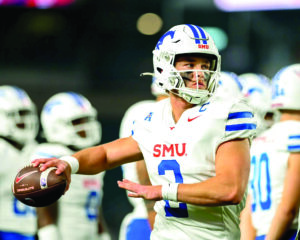By David Mullen
Despite a whirlwind of changes over the recent years — like expanded playoffs, NIL (name, image and likeness) issues and the loosening of transfer restrictions — 2024 may be cited by sports historians as the year that college football changed forever.

Photo courtesy of SMU Athletics
“This is an extraordinary new era for college football and it gives me mixed emotions,” said Rod Gilmore, an ESPN college football analyst since 1996. “While I’m excited about the new 12-team playoff and some of the new venues fans will get to enjoy as a result of realignment, I’m troubled and saddened by the loss of the Pac-12 and the loss of great rivalries that realignment has taken from us. We will all have to navigate these changes.”
Navigate is what the SMU Mustangs will have to do in their first season facing Atlantic Coast Conference (ACC) competition. Joined in the 2024 ACC by former Pac-12 teams Cal and Stanford, SMU will travel 11,304 miles this season, including a non-conference game on Saturday, Aug. 24 in Reno against the Nevada Wolf Pack
“The ACC is in a precarious situation,” Gilmore said, who played cornerback at Stanford from 1979-82. “Florida State and Clemson are the two, name brand powers in the ACC and both have publicly stated that they each want to leave and have sued the ACC.”
At present, joining the ACC is a positive for SMU. Their quality of competition improves and increased media exposure should mean an upgrade in recruiting quality players to the Hilltop. “SMU is a veteran team and have a QB I really like in Preston Stone [if he stays healthy]. If SMU makes a run, the country will find out about Stone. He has a chance to be special.”
The preseason AP Top 25 poll is out with many of the usual suspects. Georgia is No. 1, followed by The Ohio State University, Oregon of the Big Ten (first time writing those words), Texas and a Nick Saban-less Alabama Crimson Tide. For the first time since 2007, Alabama will not be coached by Saban, 72, who retired and handed the reigns to former Washington head coach Kalen DeBoer.
“We should not overlook the remarkable career of Nick Saban,” Gilmore said. “He is the greatest college football coach ever. In the long run, there is no way DeBoer can come close to replacing or matching Saban. However, Bama has the talent, depth and QB Jalen Milroe to make the new 12-team playoff this year and make another run at the National Championship.”
Alabama is also at the forefront of a very NFL-like trend in college football. Courtney Morgan is the new general manager of Alabama’s football program and is reportedly being paid $825,000 per year to run the team, after turning down a bigger offer with USC. Recruiting will be his primary concern.
“The best teams are becoming more difficult to predict each year with the increasing impact of NIL and the Transfer Portal,” Gilmore said. ”That doesn’t mean that the increase in players’ rights and a freer market is a bad thing. It just means that the shakeout of this new market is creating a lot of uncertainty that we haven’t had in previous years of college football. The coaches of those teams won’t really know how good their teams are until they see them in real games.”
The new 12-team playoff system will give more teams an opportunity to win a National Championship than ever before. “You can look to the traditional powers to retain their lofty status in this new era,” Gilmore said, “as well as a few other teams that have invested in football (i.e., more money in NIL to retain or acquire players and more money invested in recruiting, etc.) to have a shot at great season right now.
“The standard for a ‘great’ season is no longer making a bowl game. It’s making the 12-team playoff. Georgia, Ohio State, Oregon and Texas are teams that have a real shot at winning the National Championship. Those four are loaded with talent and have elite QB play, except for Ohio State, which is working with Will Howard, a transfer from Kansas State. Carson Beck (Georgia), Dillon Gabriel (Oregon) and Quinn Ewers (Texas) are all QBs who can lift their teams to a National Championship.”
Increased television revenue, the dangling of NIL opportunities, conference realignment and the advent of GMs in college football has brought about extraordinary changes. NCAA football seems to have gone from a special Saturday experience spiked with emotional ties to an entertainment product cranked out for the richest and most powerful universities and TV conglomerates to exploit.
“With all the complaints about NIL and the transfer portal, folks have ignored the fact that those two items have made the game better and more competitive,” Gilmore said. “Now, talent is becoming a little more spread out, [but] not to the point of hurting Blue Bloods, but giving teams outside the top 10 a chance to be relevant.
“Having the free market come to college athletics is a good thing.”
